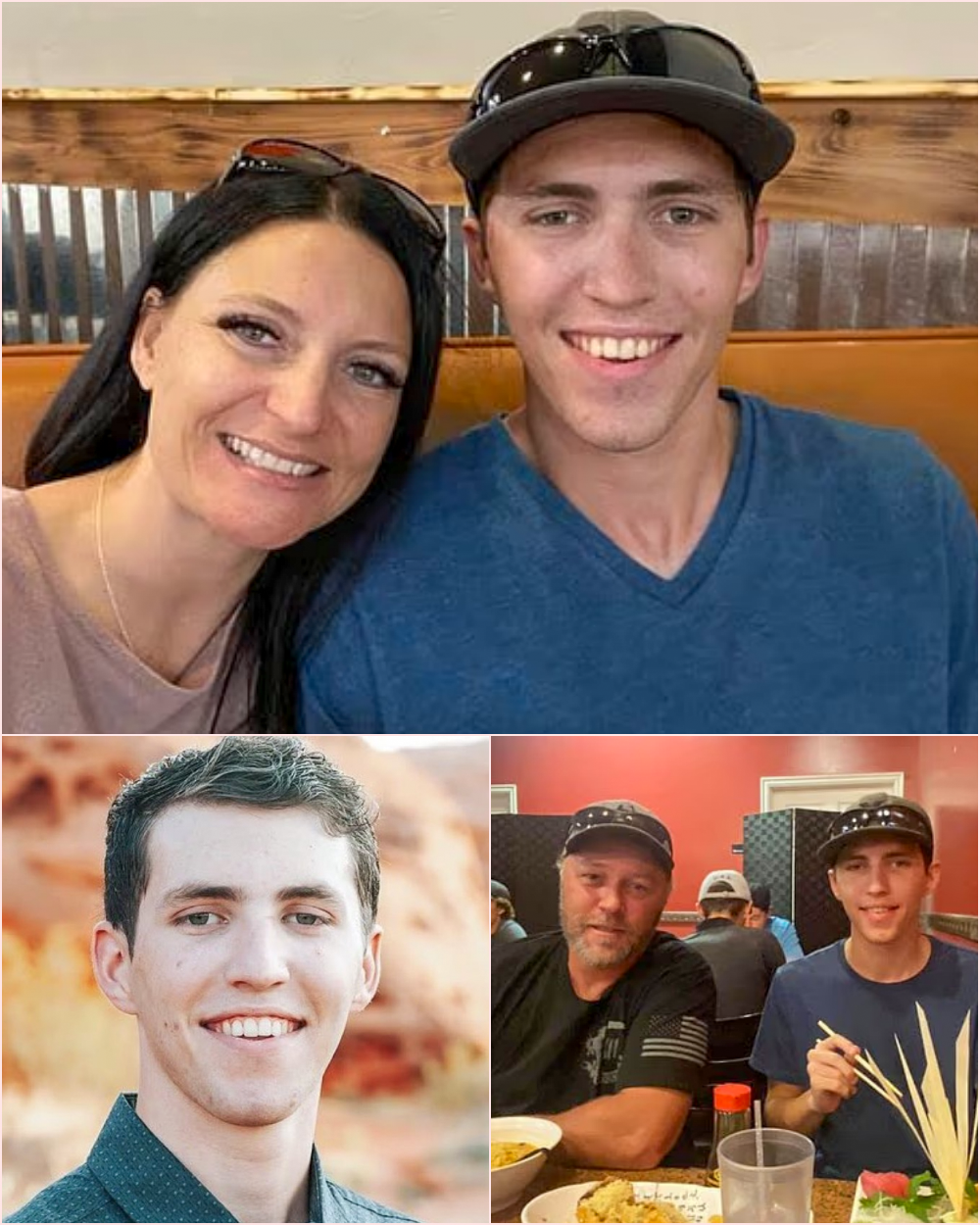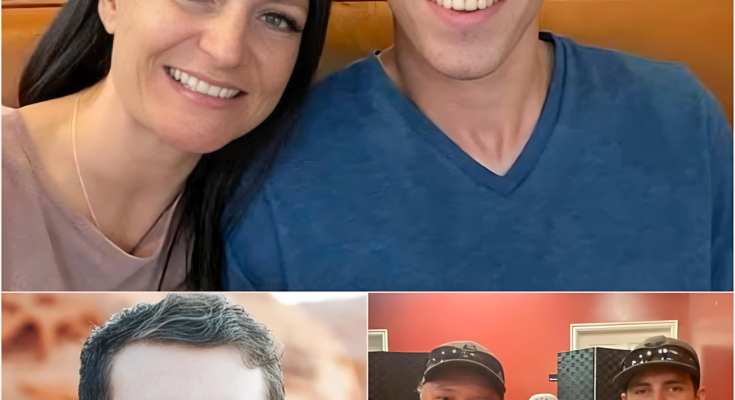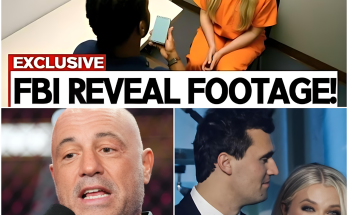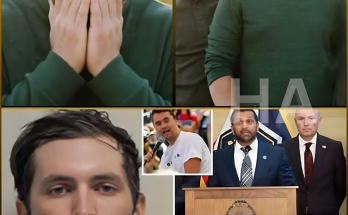
The words came from a father whose voice once carried authority in uniform but now cracked with helpless grief:
“He was surrounded by love, yet surrendered to a call we couldn’t hear.”
That was how Matt Robinson, a law officer with 27 years of service, described the last dinner he shared with his 22-year-old son Tyler — the same dinner that turned a proud $600,000 family home in Utah into the focal point of a tragedy gripping the nation.
The Dinner Before the Collapse
The Robinsons had gathered as they always did. Amber, the mother, had prepared roast chicken and cornbread, the smells drifting through the open-plan kitchen. Photographs of family vacations lined the walls, trophies sat on shelves, laughter echoed faintly in the background from younger brothers playing upstairs.
But Tyler’s face looked different that night. His jaw tightened, his eyes restless. He pushed his plate away, barely touching his food. Then, with a voice that was quiet but sharp enough to slice through the room, he began speaking about Charlie Kirk’s upcoming campus appearance.
“He said things that chilled me,” Amber recalled later, her hands trembling. “Words about not liking him, about him spreading things that were dangerous. It wasn’t my boy speaking. It was something else.”
The family froze. Matt’s fork clinked against his plate as he lowered it. Rachel, the grandmother, stared down, unable to meet anyone’s eyes.
And then Matt asked the question every father dreads:
“Why, Tyler? Why are you talking like this?”
Tyler’s gaze dropped. He didn’t answer. That silence would become the last true conversation between father and son.
A Father’s Cruel Choice
For nearly three decades, Matt Robinson wore a badge, upholding law and order. He had faced violent suspects, tearful victims, endless paperwork. But nothing could prepare him for recognizing his own son in blurry surveillance clips from Utah Valley University.
“I knew the way he ran, the way his shoulders moved,” Matt admitted to colleagues. “I knew before the phone rang.”
That night, confronted by his father, Tyler confessed. His voice cracked, his body trembling. He muttered words that tore his parents apart.
Matt wept. For the first time in his career, he wasn’t an officer or a protector. He was a broken father. And then he faced the cruelest choice of his life: hold on to blood, or uphold justice.
He chose the latter.
“It was the most painful duty I ever carried,” he whispered later, his face wet with tears. “But justice isn’t real if it stops at your doorstep.”
A Mother’s Collapse
Amber Robinson, who worked daily with families in need, collapsed into her chair as Tyler confessed. Her hands shook violently. “We gave him everything,” she sobbed. “A good home, vacations, support. He never wanted for anything. But something else had its grip on him.”
Neighbors described Amber as a radiant presence, always waving from the porch. Now they see her as “haunted.”
“She still sets the table for five,” one neighbor said quietly. “She can’t stop.”
The $600,000 Home Under Siege
The Robinson home in Washington, Utah, once a symbol of middle-class success, is now a landmark of sorrow. Television vans crowd the street. Strangers walk by slowly, snapping photos.
Inside, family albums of ski trips and graduations have been scrutinized by millions online. Every smile is dissected, every pose reinterpreted as if the past could explain the present.
“It doesn’t feel like our house anymore,” Amber whispered. “It feels like a museum of what we lost.”
The Press Conference That Shook the Room
When Governor Spencer Cox revealed that Tyler’s troubling comments had first surfaced at a family dinner, reporters erupted.
“Was he acting on his own?” shouted one.
“Or repeating words someone else put in his mouth?” pressed another.
The governor paused. Six long seconds stretched across the room. Cameras zoomed in on his clenched jaw. Finally, he muttered: “We are still investigating.”
That hesitation ignited America. Commentators replayed the pause on endless loops. Memes labeled it “the silence louder than words.” To many, it was undeniable evidence that something bigger lurked in the shadows.
Experts Clash on Television
On prime-time panels, experts sparred.
One declared: “You don’t go from a scholarship student to this overnight. Someone whispered to him. Someone guided him.”
Another fired back: “Don’t invent phantoms. This is personal failure, not orchestration.”
Audiences roared. Twitter trended. Hashtags multiplied: #DinnerConfession, #BrokenHouse, #WhyHeSaidIt.
The nation wasn’t just consuming news; it was participating in a trial of suspicion.
The Questions No One Can Ignore
If the press conference left a vacuum, the nation rushed to fill it. Six seconds of silence from the governor became six million words of speculation online. What started as a straightforward announcement twisted into the most whispered refrain across America:
“How could a student with everything, with no reason to want, suddenly collapse into something this devastating?”
Tyler Robinson had a scholarship. He lived in a spacious $600,000 home. He vacationed with family, smiled in every photo, posed in graduation gowns and Christmas pajamas. His father was respected. His mother admired. He had everything — at least everything visible.
So why?
“No One Acts Alone”
In diners across the Midwest, parents leaned across coffee mugs. “No kid just flips like that,” one father in Ohio muttered. “Somebody whispered to him. Somebody promised him something.”
On a late-night talk show, a comedian dropped his smirk and asked bluntly: “A scholarship student throws it all away for nothing? Please. That’s not impulse. That’s influence.”
His audience roared — not with laughter, but with applause.
Social Media in Overdrive
Hashtags surged: #WhoSpokeToHim, #TheCall, #NoOneAlone.
Clips of the governor’s pause trended with captions: “This silence says it all.” Memes compared the pause to a curtain slipping, revealing a shadow everyone already suspected.
Red-circled screenshots of contracts, blurry photos of meetings, whispers of names never printed — all became part of an ever-expanding puzzle.
One viral post read: “A vest doesn’t fail itself. A boy doesn’t break himself. Shadows move pieces.”
The Diner Test
Journalists took to the road, interviewing strangers in small-town restaurants. The responses were eerily consistent.
“He wasn’t desperate,” said a waitress in Kansas, shaking her head. “You can see desperate in a man’s eyes. His weren’t desperate. They were distracted.”
A retired teacher in Georgia added: “Students don’t collapse like that unless someone puts a script in their hand.”
Even in Utah, neighbors whispered the same line: “He didn’t act alone.”
The Academic Puzzle
Professors at Utah State spoke carefully, but their words carried weight. One noted: “He was quiet, yes. But there was no trail of rage. No warning signs. His record is too clean for a sudden spiral. Something fed him.”
Another professor, visibly uneasy, added: “There are things you expect to see before a collapse. Isolation, grades dropping, erratic behavior. But none of that. That’s why this unsettles us. It feels… planted.”
The Call Beyond the Walls
What unsettled America most was a phrase Matt Robinson himself had used: “He was surrounded by love, yet surrendered to a call we couldn’t hear.”
That line spread like wildfire. People asked: What was the call? Who made it?
It became the nation’s chilling refrain — a way of saying what everyone thought but no one dared state aloud: that Tyler had listened to someone, or something, far beyond his family’s table.
Political Whispers
Though no party was named, the political undertone was unmistakable. Pundits avoided specifics but smirked knowingly.
One prime-time commentator asked: “Who benefits from Charlie Kirk’s fall? Start there.”
Another chimed in: “If silence at a press conference can feel like confirmation, maybe it is.”
The implication was clear: a young man may have been a pawn, and pawns never move themselves.
The Debate Splits the Nation
Talk shows replayed the debate endlessly. Was Tyler manipulated? Promised something? Threatened?
Some insisted it was all coincidence. Others said coincidence doesn’t live in $600,000 homes.
A mother in Florida summed it up to a local station: “If love, comfort, and opportunity weren’t enough to anchor him, then something else pulled him away. We all know what that something was. We just can’t say it.”
A Widow’s Echo
By Saturday morning, Erika Kirk’s earlier words took on a new resonance. At her vigil she had said: “The silence failed. What failed most of all were those who heard and said nothing.”
Now, paired with Matt’s haunting line, the puzzle felt complete. Erika’s grief sounded less like sorrow and more like a verdict.
“Her eyes accused the shadows,” one mourner said. “She didn’t have to name them. We named them ourselves.”
Unanswered
And so the question hung in the air, heavier than any press release:
“What was the call he heard — and who was speaking?”
America didn’t have the answer. But in diners, in classrooms, in living rooms, the silence became its own kind of proof.
Erika Kirk’s Fire
For Charlie Kirk’s widow, Erika, the revelations were unbearable. At a candlelit vigil, she clutched her daughter and stared into cameras.
Her voice cracked, then steadied: “The vest failed. The silence failed. But what failed most of all were those who heard and chose to stay quiet.”
She didn’t name names. She didn’t need to. The crowd gasped, murmuring in recognition. Everyone understood who she meant without her saying it.
A Father’s Tears Go Public
Matt Robinson finally addressed reporters outside his home. His uniform looked too big on his sagging frame. His voice rasped.
“My son confessed to me,” he said. “And I turned him in. Because justice doesn’t stop where blood begins.”
Then, eyes brimming, he delivered the line that will echo through America:
“He was surrounded by love, yet surrendered to a call we couldn’t hear.”
The reporters fell silent. Some wiped their eyes. Others scribbled furiously. Across the country, parents reading those words broke down in tears.
America Reacts
In diners from Kansas to Ohio, in subway cars in New York, in classrooms in Utah, Americans debated.
A truck driver told a local station: “That dinner wasn’t theirs. That dinner was all of ours. A warning.”
A college sophomore in Michigan tweeted: “If love and comfort weren’t enough, what was the call he heard? And who was behind it?”
Late-night talk shows turned the father’s line into the night’s refrain. Comedians paused their jokes, their faces solemn.
The House Divided
The Robinson family, once filled with joy, is now fractured. Tyler’s younger brothers whisper at school, their friends staring at them like curiosities. Amber tries to shield them, but her own tears betray her.
Rachel, the grandmother, sits silently by the window, clutching rosary beads. “I prayed for my grandson,” she whispered to a local reporter. “But prayers don’t erase words once spoken.”
The Hidden Shadows
The unanswered question remains: What was the “call we couldn’t hear”?
Some insist it was ideology. Others claim it was influence from powerful circles. Commentators nod knowingly but stop short of naming names.
In the living rooms of America, whispers grow: if a family so full of love, so complete, could lose a son to silence and shadows, what chance do the rest of us have?
Closing Line
The Robinsons will never gather around that dinner table again. The $600,000 home stands, but as a monument to loss.
And America is left with a father’s words — words that pierce deeper than any report, words that feel like confession and accusation all at once:
“He was surrounded by love, yet surrendered to a call we couldn’t hear.”
This article is based on available reports, eyewitness accounts, and public commentary. Certain details have been dramatized to reflect the intensity of public debate. Official findings remain with the authorities.



